- Home
- Maya Angelou
All God's Children Need Traveling Shoes Page 2
All God's Children Need Traveling Shoes Read online
Page 2
The hospital acquired color, there was laughter in its halls and Guy’s good humor stopped being contrived. He and the doctors, surprisingly, had been right. Recovery was evident in the ways of his hands and in his lumbering, cast-top-heavy lurching up and down the corridors.
Outside, the sun, which had pounced, penetrating and hostile, now covered me with beneficial rays, hoisting me out of depression and back on my feet, where my new mood told me I deserved to be.
I smiled at strangers and took notice of buildings and streets. Weeks passed before I was conscious that I had let go of misery.
The visit to Efua, and Julian’s reluctant but sincere offer to be my brother had been very strong medicine.
I was impatient to get my life in order. Obviously, I wouldn’t go to Liberia, so … I had to find a job, a car and a house for Guy to come to while he continued recuperating. I needed to get my hair cut, a manicure, a pedicure. My clothes were disgraceful.
Flashes of panic occurred and recurred. Was it possible that during the two-month depression, I had damaged my determination? The only power I had ever claimed was that I had over myself. Obviously, I had come perilously close to giving it away to self-pity.
I thought about Julian’s hard words, “Your mother didn’t raise you in a dog house.” His intuition had come understated.
My mother, that pretty little woman with a steel chest, had taught me and my brother Bailey that each person was expected to “paddle his own canoe, stand on his own feet, put his own shoulder to the wheel, and work like hell.” She always added, “Hope for the best, but be prepared for the worst. You may not always get what you pay for, but you will definitely pay for what you get.” Vivian Baxter had axioms for every situation, and if one didn’t come to mind when she needed it, she would create a better one on the moment.
I had been a pretty good student, ingesting and internalizing her advice, so now I pushed away the gnawing fear that I might have lost some of my vital willfulness.
I looked at the disheveled mess I had been living in and at my nearby neighbors. To my surprise, many of the women who had been at that first-night party and who had faithfully attended Guy’s hospital room, lived down the hall from me. I was also amazed to learn that mops, brooms, pails and other cleaning implements were available for the free use of the center’s guests.
Alice and Vicki watched me emerge from the bonds of my chrysalis and accepted me with no comment, save an easy teasing. While I swabbed my small floor and washed my clothes Alice said, “I would offer to help you Maya, but somehow I didn’t inherit any of the race’s domestic talents.”
Vicki offered, but I knew the work was cathartic, so I washed walls, polished door knobs and the tiny window. The scales and stench of defeat floated into the pail’s dirty water.
The YWGA residents forgave me my drunken spree with hopelessness and we began to spend time together in the building’s cafeteria and on the streets filled with views I had not seen. Alice took me to Black Star Square to see the monumental arch, named in part for the newspaper founded in the United States by the ex-slave and abolitionist, Frederick Douglass.
Vicki and Sylvia Boone rode with me to Flagstaff House, the seat of government. Seeing Africans enter and leave the formal building made me tremble with an awe I had never known. Their authority on the marble steps again proved that Whites had been wrong all along. Black and brown skin did not herald debasement and a divinely created inferiority. We were capable of controlling our cities, our selves and our lives with elegance and success. Whites were not needed to explain the working of the world, nor the mysteries of the mind.
My visits to the hospital diminished to one daily appearance and Guy’s gladness made me young again.
Efua introduced me to the chairman of the Institute of African Studies at the university and pleaded with him to hire me. She had told him that I had been on my way to a job in Liberia until my seventeen-year-old son had been involved in an accident, adding that I had to stay in Ghana until he fully recovered. She smiled at him and said I was already trying to hear Fanti, and would make a good Ghanaian.
Professor J. H. Nketia, one of Ghana’s leading scholars, was so unpretentious as to be unsettling. He listened with patience to Efua, then asked me, “Can you type?” When I said only a little, but that I could file and write, he gathered his chin in a stubby brown hand and smiled. “Can you start on Monday?” He told me I would be paid on the Ghanaian scale and he would arrange for me to get a small car. I knew that the proffered job spoke more of his own compassion and his affection for Efua than of a need for my services.
Foreign employees at the university earned high salaries, compared to the national average wage, and very liberal compensations. They were given housing allowances, tuition or aid for their offspring’s education, transportation allowances and a perk charmingly referred to as dislocation allowance. They had been recruited in their own countries, and hired for their academic credentials and experience. Save for two youthful years at night school, I had only a high school education.
I challenged myself to do whatever job assigned to me with intense commitment and a good cheerfulness.
A professor went on leave and I moved into his house for three months. When Guy was released from the hospital he settled into our furnished, if temporary, home.
The community of Black immigrants opened and fitted me into their lives as if they had been saving my place.
The group’s leader, if such a collection of eccentric egos could be led, was Julian. He had three books published in the United States, had acted in a Broadway play, and was a respected American-based intellectual before an encounter with the CIA and the FBI caused him to flee his country for Africa. He was accompanied in flight and supported, in fact, by Ana Livia, who was at least as politically volatile as he.
Sylvia Boone, a young sociologist, had come to Africa first on a church affiliated tour, then returned with sophistication, a second Master’s degree and fluent French to find her place on the Continent. Ted Pointiflet was a painter who argued gently, but persistently that Africa was the inevitable destination of all Black Americans. Lesley Lacy, a sleek graduate student, was an expert on Marxism and Garveyism, while Jim and Annette Lacy, no relation to Lesley, were grade school teachers and quite rare among our group because they listened more than they talked. The somber faced Frank Robinson, a plumber, had a contagious laughter, and a fierce devotion to Nkrumah. Vicki Garvin had been a union organizer, Alice Windom had been trained in sociology. I called the group “Revolutionist Returnees.”
Each person had brought to Africa varying talents, energies, vigor, youth and terrible yearnings to be accepted. On Julian’s side porch during warm black nights, our voices were raised in attempts to best each other in lambasting America and extolling Africa.
We drank gin and ginger ale when we could afford it, and Club beer when our money was short. We did not discuss the open gutters along the streets of Accra, the shacks of corrugated iron in certain neighborhoods, dirty beaches and voracious mosquitoes. And under no circumstances did we mention our disillusionment at being overlooked by the Ghanaians.
We had come home, and if home was not what we had expected, never mind, our need for belonging allowed us to ignore the obvious and to create real places or even illusory places, befitting our imagination.
Doctors were in demand, so Ana Livia had been quickly placed in the Military Hospital and within a year, had set up a woman’s clinic where she and her platoon of nursing sisters treated up to two hundred women daily. Progressive journalists were sought after, so Julian, who wrote articles for American and African journals, also worked for the Ghana Evening News. Frank and his partner Carlos Allston from Los Angeles founded a plumbing and electric company. Their success gave heart to the rest. We had little doubt about our likability. After the Africans got to know us their liking would swiftly follow. We didn’t question if we would be useful. Our people for over three hundred years had been made so useful, a
bloody war had been fought and lost, rather than have our usefulness brought to an end. Since we were descendants of African slaves torn from the land, we reasoned we wouldn’t have to earn the right to return, yet we wouldn’t be so arrogant as to take anything for granted. We would work and produce, then snuggle down into Africa as a baby nuzzles in a mother’s arms.
I was soon swept into an adoration for Ghana as a young girl falls in love, heedless and with slight chance of finding the emotion requited.
There was an obvious justification for my amorous feelings. Our people had always longed for home. For centuries we had sung about a place not built with hands, where the streets were paved with gold, and were washed with honey and milk. There the saints would march around wearing white robes and jeweled crowns. There, at last, we would study war no more and, more important, no one would wage war against us again.
The old Black deacons, ushers, mothers of the church and junior choirs only partially meant heaven as that desired destination. In the yearning, heaven and Africa were inextricably combined.
And now, less than one hundred years after slavery was abolished, some descendants of those early slaves taken from Africa, returned, weighted with a heavy hope, to a continent which they could not remember, to a home which had shamefully little memory of them.
Which one of us could know that years of bondage, brutalities, the mixture of other bloods, customs and languages had transformed us into an unrecognizable tribe? Of course, we knew that we were mostly unwanted in the land of our birth and saw promise on our ancestral continent.
I was in Ghana by accident, literally, but the other immigrants had chosen the country because of its progressive posture and its brilliant president, Kwame Nkrumah. He had let it be known that American Negroes would be welcome to Ghana. He offered havens for Southern and East African revolutionaries working to end colonialism in their countries.
I admitted that while Ghana’s domestic and foreign policy were stimulating, I was captured by the Ghanaian people. Their skins were the colors of my childhood cravings: peanut butter, licorice, chocolate and caramel. Theirs was the laughter of home, quick and without artifice. The erect and graceful walk of the women reminded me of my Arkansas grandmother, Sunday-hatted, on her way to church. I listened to men talk, and whether or not I understood their meaning, there was a melody as familiar as sweet potato pie, reminding me of my Uncle Tommy Baxter in Santa Monica, California. So I had finally come home. The prodigal child, having strayed, been stolen or sold from the land of her fathers, having squandered her mother’s gifts and having laid down in cruel gutters, had at last arisen and directed herself back to the welcoming arms of the family where she would be bathed, clothed with fine raiment and seated at the welcoming table.
I was one of nearly two hundred Black Americans from St. Louis, New York City, Washington, D.C., Los Angeles, Atlanta, and Dallas who hoped to live out the Biblical story.
Some travelers had arrived at Ghana’s Accra Airport, expecting customs agents to embrace them, porters to shout—“welcome,” and the taxi drivers to ferry them, horns blaring, to the city square where smiling officials would cover them in ribbons and clasp them to their breasts with tearful sincerity. Our arrival had little impact on anyone but us. We ogled the Ghanaians and few of them even noticed. The newcomers hid disappointment in quick repartee, in jokes and clenched jaws.
The citizens were engaged in their own concerns. They were busy adoring their flag, their five-year-old independence from Britain and their president. Journalists, using a beautiful language created by wedding English words to an African syntax, described their leader as “Kwame Nkrumah, man who surpasses man, iron which cuts iron.” Orators, sounding more like Baptist southern preachers than they knew, spoke of Ghana, the jewel of Africa leading the entire continent from colonialism to full independence by the grace of Nkrumah and God, in that order. When Nkrumah ordered the nation to detribalize, the Fanti, Twi, Ashanti, Ga and Ewe clans began busily dismantling formations which had been constructed centuries earlier by their forefathers. Having the responsibility of building a modern country, while worshipping traditional ways and gods, consumed enormous energies.
As the Ghanaians operated an efficient civil service, hotels, huge dams, they were still obliged to be present at customary tribal rituals. City streets and country roads were hosts daily to files of celebrants of mourners, accompanied by drums, en route to funerals, outdoorings (naming ceremonies), marriages or the installations of chiefs, and they celebrated national and religious harvest days. It is small wonder that the entrance of a few Black Americans into that high stepping promenade went largely unnoticed.
The wonder, however, was neither small nor painless to the immigrants. We had come to Africa from our varying starting places and with myriad motives, gaping with hungers, some more ravenous than others, and we had little tolerance for understanding being ignored. At least we wanted someone to embrace us and maybe congratulate us because we had survived. If they felt the urge, they could thank us for having returned.
We, who had been known for laughter, continued to smile. There was a gratifying irony in knowing that the first family of Black Americans in Ghana were the Robert Lees of Virginia, where the first Africans, brought in bondage to the American Colonies in 1619, were deposited. Robert and Sarah Lee were Black dentists who had studied at Lincoln University in Pennsylvania with the young Kwame Nkrumah, and had come in 1957 to Ghana to celebrate its just won independence. They returned a year later with their two sons to become Ghanaian citizens.
The Lees and the presence of W.E.B. Du Bois and Alphaeus Hunton nearly legitimized all of us.
Dr. Du Bois and his wife Shirley Graham had been personally invited by the President to spend the rest of their lives in Ghana. Dr. Hunton had come from the United States with his wife Dorothy to work with Dr. Du Bois on the ambitious Encyclopedia Africana.
The rest of the Black Americans, who buzzed mothlike on the periphery of acceptance, were separated into four distinct groups.
There were over forty families, some with children, who had come simply and as simply moved into the countryside hoping to melt onto the old landscape. They were teachers and farmers.
The second group had come under the aegis of the American government and were viewed with suspicion by Ghanaians, and Black Americans stayed apart from them as well. Too often they mimicked the manners of their former lords and ladies, trying to treat the Africans as Whites had treated them. They socialized with Europeans and White Americans, fawning upon that company with ugly obsequiousness.
There was a minuscule business community which had found a slight but unsure footing in Accra.
Julian’s circle had stupendous ambitions and thought of itself as a cadre of political émigrés. Its members were impassioned and volatile, dedicated to Africa, and Africans at home and abroad. We, for I counted myself in that company, felt that we would be the first accepted and once taken in and truly adopted, we would hold the doors open until all Black Americans could step over our feet, enter through the hallowed portals and come home at last.
Guy, wearing a metal and leather neck brace, enrolled in the university and moved happily into Mensah Sarbah Dormitory Hall. I was surprised and delighted to find that being alone brought a deeply satisfying bliss. I hummed, sang to myself, strutted, cooked and entertained for a month before the professor returned and claimed his house.
The YWCA wasn’t as sterile on my second stay. I had a job, a car, some money and amusing friends.
All meals were served in the ground floor dining room under the watchful eyes of Directress Vivian Baeta, the daughter of a Ghanaian clergyman. Miss Baeta was young and pleasant, but a little too correct for our tastes. She frowned upon loud voices and noisy laughter and most diners, often white collar workers from nearby office buildings who filled the restaurant each mealtime, acceded to her wishes. The Black American residents, however, having no living room save Julian’s side porch, used the dining room
as a place to gather, to talk, to argue and maybe to flirt with male friends before returning to the celibate cells on the second floor.
Although we tried to respect Miss Baeta’s desires, passion dictated the volume of our conversations. The directress’s disapproving look fell upon us frequently.
One lunch time Vicki, Alice and I were occupying our usual table when a voice louder than any tone we had ever used split the quiet air.
“No rye?” Again, “No rye? What fa country you peepo got? No rye?” A huge, six-foot-tall woman was standing at a window table. She wore West African cloth, her head tie was large and beautifully wrapped, and she was angry.
“You peepo! You Ghanaians. You got yourself your Kwame Nkrumah, but you got no rye. Last night, you give the peepo cassava. Breakfast you give us garri. Lunch you give us yam. Still no rye.” She was complaining specifically to the persons in charge who were nowhere to be seen. Miss Baeta had poked her head into the dining room, seen the irate woman, and had hastily withdrawn. Other diners put their heads dangerously close to their plates as if searching for some microscopic intruder in their food.
The woman continued. “I come to you peepose Country from Sierra Leone where we serve rye. I know this country is proud Ghana, but it still is Africa and you don’t give me rye. You think you England? You think you German? Where is the rye?”
The woman was demanding rice and I quickly sympathized with her. The grandmother who raised me was a firm believer in rice. The only white newspapers which reached our house were brought at grandmother’s request by maids oncoming from work. Momma was a good cook who experimented with the exotic recipes she found in the White papers. She would prepare Italian spaghetti, macaroni and cheese, scalloped potatoes, O’Brien potatoes, creamed noodles, but still she served rice with each meal. The family was not obliged to eat the rice if we were pleased with the other starches, but Momma never felt the table was properly set until the filled rice bowl was placed in its usual spot.

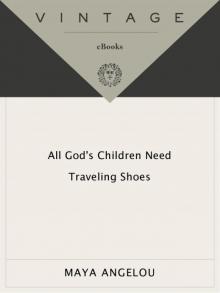 All God's Children Need Traveling Shoes
All God's Children Need Traveling Shoes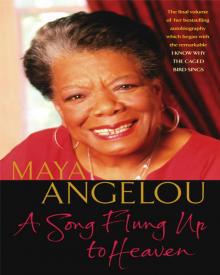 A Song Flung Up to Heaven
A Song Flung Up to Heaven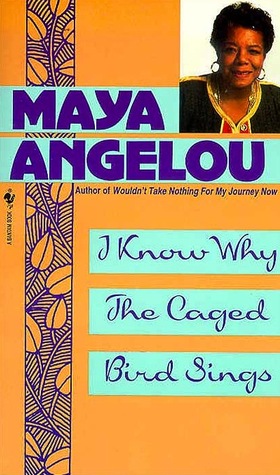 I Know Why the Caged Bird Sings
I Know Why the Caged Bird Sings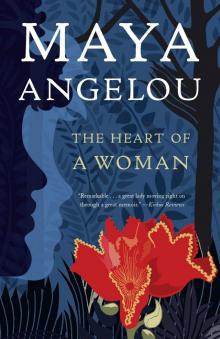 The Heart of a Woman
The Heart of a Woman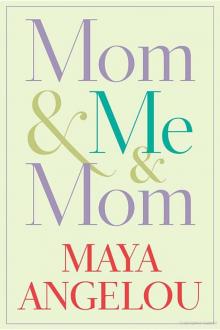 Mom & Me & Mom
Mom & Me & Mom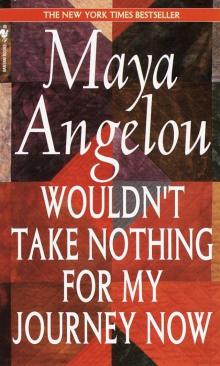 Wouldn't Take Nothing for My Journey Now
Wouldn't Take Nothing for My Journey Now Singin' and Swingin' and Gettin' Merry Like Christmas
Singin' and Swingin' and Gettin' Merry Like Christmas Just Give Me a Cool Drink of Water 'Fore I Diiie
Just Give Me a Cool Drink of Water 'Fore I Diiie The Collected Autobiographies of Maya Angelou
The Collected Autobiographies of Maya Angelou Letter to My Daughter
Letter to My Daughter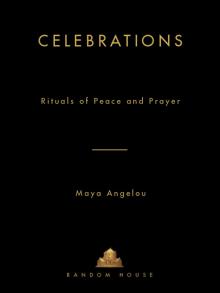 Celebrations: Rituals of Peace and Prayer
Celebrations: Rituals of Peace and Prayer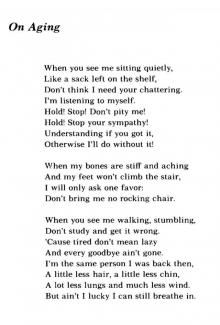 The Complete Collected Poems
The Complete Collected Poems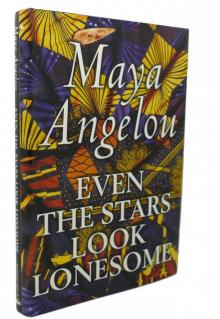 Even the Stars Look Lonesome
Even the Stars Look Lonesome Hallelujah! The Welcome Table: A Lifetime of Memories With Recipes
Hallelujah! The Welcome Table: A Lifetime of Memories With Recipes The Complete Collected Poems of Maya Angelou
The Complete Collected Poems of Maya Angelou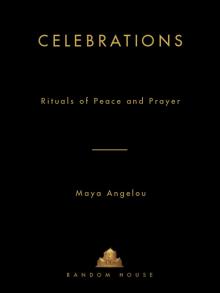 Celebrations
Celebrations